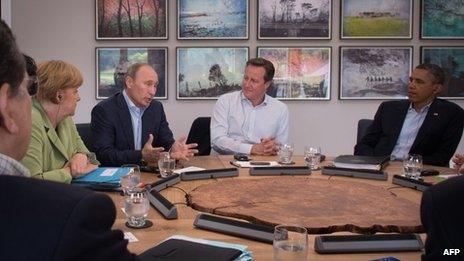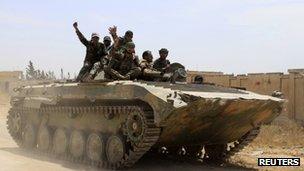Did G8 summit deliver on Syria?
- Published

Agreed to disagree? Russian President Putin insists he was not "isolated"
The Syrian crisis inevitably overshadowed this G8 summit and in many ways the outcome could be characterised as one step backwards followed by one step forward.
President Vladimir Putin may have vigorously denied it, but the Russians had risked isolation at this summit and it was not clear at one point if there would be any common language on Syria at all.
In the event the communique is largely a reaffirmation of what was said at the Geneva Conference in June 2012 charting the steps needed to move ahead with a political transition.
British Prime Minister David Cameron said that there was now maximum diplomatic pressure to get all sides in Syria to the negotiating table as soon as possible.
That, of course, has been the core of the international consensus on Syria - such as it is - for nearly 12 months.
Though the prime minister did have a point when he noted that the whole idea of an international conference on Syria had been "slipping away" recently.
Now it is back in play, but not in July, possibly in August - but don't hold your breath.

Syrian government troops have recently scored a number of important victories
Assad factor
The test will be the extent to which the Russians - themselves under pressure at the G8 - are willing to push the Syrian leadership into exploring the possibilities of a political deal.
That may depend more upon the unfolding conflict on the ground where the government forces and their Hezbollah allies have been doing rather better lately.
Another test will be the extent to which key Western powers can deliver the divided Syrian opposition to the negotiating table.
The price of getting the Russians on board?
Not an extravagant one. There is tough language in the communique on the need for the Syrians collectively to destroy and expel all "organisations and individuals affiliated to al-Qaeda". That statement is no problem for any of the G8 leaders.
The price tag was more in what was not mentioned: no specific reference to President Bashar al-Assad's future - though Mr Cameron in questions made it clear he had to go.
There was also no explicit reference to alleged war crimes committed by the government forces - rather a more muted condemnation of "all human rights violations and abuses" in Syria.
Broader agenda
Neither the Russians nor the key Western powers appear to have substantially altered their view.
Mr Putin, for example, said that he would go on arming the Assad government, adding that it was perfectly legal.
In terms of Russia's alleged isolation, Mr Putin said that "it was an inclusive, intense discussion by people who wanted to find a united and effective way to solve Syria's problems".
It is a pretty good example of diplomacy being the art of the possible. The fascinating absence here was any public comment on Syria from the US President Barack Obama.
There was, of course, a much broader agenda than Syria.
As the summit opened, talks were launched on a new EU-US trade deal. That will be crucial for jobs on both sides of the Atlantic.
But Mr Cameron's signature issues here were the linked themes of tax and transparency.
He did not get all he wanted. But campaigning groups say he deserves great credit for putting the issues of tax evasion and the shadowy shell companies that enable this on the agenda at all.
Once there, it is not going to go away. It is an issue of crucial importance to the developing world.
African nations are estimated to lose $2 (£1.3) from illicit funds siphoned away from their economies - on which no tax is paid - for every single dollar they gain in development aid.
- Published18 June 2013
- Published18 June 2013
- Published18 June 2013
- Published17 June 2013
- Published18 June 2013
- Published18 June 2013
- Published17 June 2013
- Published17 June 2013
- Published17 June 2013